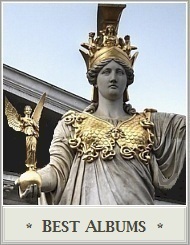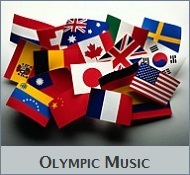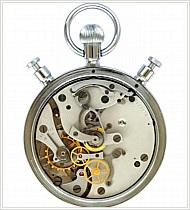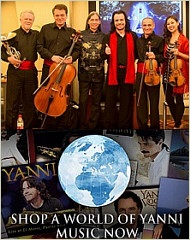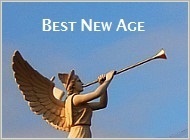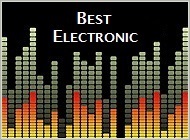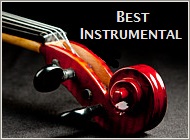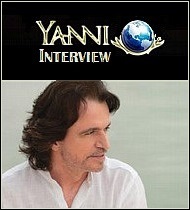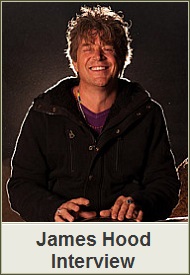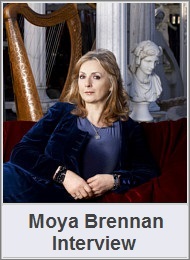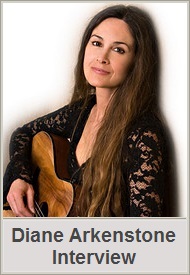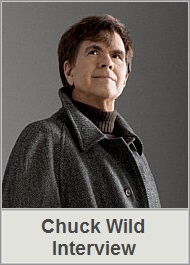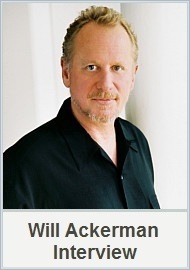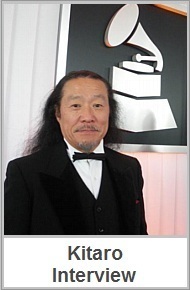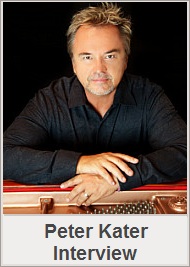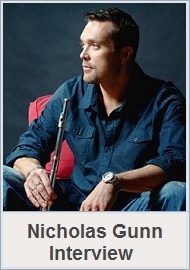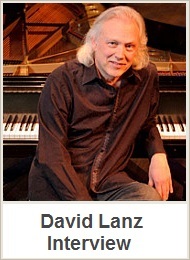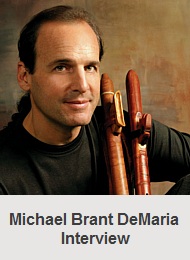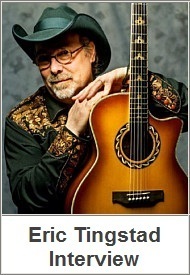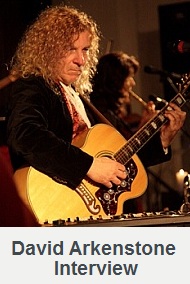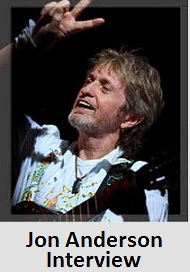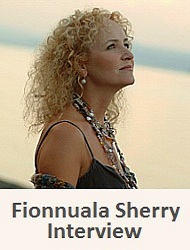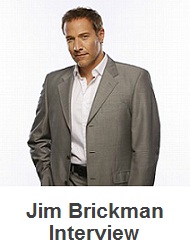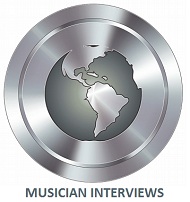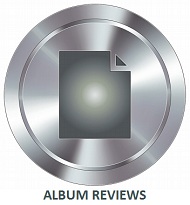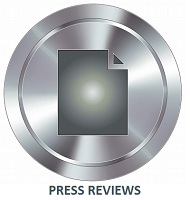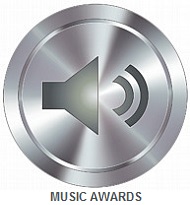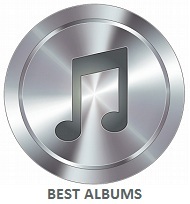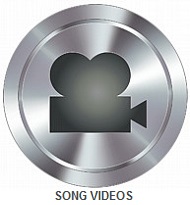Posts Tagged ‘Liquid Mind’

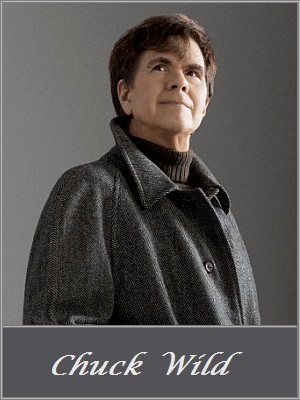 New Age Music World interview host and publicist John P. Olsen had an opportunity to interview songwriter, recording artist, and Liquid Mind Musical Healthcare® experience developer Chuck Wild.
New Age Music World interview host and publicist John P. Olsen had an opportunity to interview songwriter, recording artist, and Liquid Mind Musical Healthcare® experience developer Chuck Wild.
John P. Olsen: Thank you for accepting my interview invitation Chuck. It’s a privilege to host your newest interview in 2013!
Chuck Wild: Hi John, thanks for the insightful questions, I appreciate the opportunity to talk about my journey in musical healthcare.
John: My admiration for your work began when you were a member of the phenomenal new wave pop band Missing Persons, and years later when you transitioned to the highly successful artist title Liquid Mind. Let’s begin with your earliest experiences as a musician Chuck. How did your music career begin prior to joining Missing Persons?
Chuck Wild: I grew up in Kansas City, Missouri, and began playing piano at age four. I was diagnosed with a congenital hip problem (which was completely resolved by age eight), but back in the 1950’s the only cure was to remain off my feet for a full year. My parents hired a wonderful caregiver for me for that year, and she used to carry me down to the piano every morning and teach me how to play.
By the age of five I was permitted to walk with a brace for about a year, but the piano already had me hooked. By age six, I was mobile, and my heart’s desire was to sit behind the church organist at our church, so my folks arranged for me to spend all morning most Sundays with our organist, Gladys Hamilton Combs. After services, Gladys would sometimes let me play the giant Kilgen organ which had 39 ranks and five keyboards.
My formal music training started as member of the kids’ choir at church and also in grade school, where daily music was part of the curriculum. At age 6, I began studying classical piano privately with various teachers until age 16. During high school, I played organ for youth services every Sunday for about four years, where I gained lots of experience improvising and playing the type of meditational music that eventually became Liquid Mind. I also sang in an award winning male octet, and played piano for our high school concert choir at times. Though I have a degree in Business Administration, I studied and performed music all through college as well.
After graduating from college I served four years in the Navy. The captain of our ship had sung in the famous Robert Shaw Chorale, and when he found out I was a piano player, we made the rounds together of Naval and local clubs all over the Pacific. He would sing, I would accompany on some of the most colorful pianos I’ve ever played on, and in some of the most exotic places I’ve ever been. After serving in the Navy, I went on the road with various bands for 11 years, “paying my dues” as the saying goes. I played in almost a dozen such show and cover bands prior to coming to LA (1979) and joining the band Missing Persons in 1980.
John: What factors led to your decision to begin a career as a musician?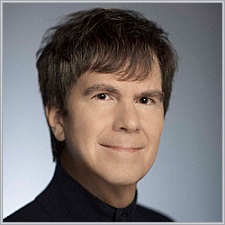
Chuck Wild: The very first water color I painted as a child was a picture of me sitting in front of a large pipe organ, so perhaps there was some early predestination about the career. I remember telling my parents when I returned home for the Navy that I wanted to be a musician. My folks, realizing that the life of a musician can be very challenging, were not encouraging, and suggested I might try it for just a couple of years. Two years has turned into 40 years now…
I wish I could say I had a grand design back then, but the truth at that point in time was much shallower. I just enjoyed being on the road in the many bands, and did learn a lot about life and music. The “road” is also the “tuition” a new musician pays for better musicianship. There have been many ups and downs, I remember in the early days sleeping in the back of my van with a pillow on the pedal board of my old Hammond B3 organ. Still, they were generally happy days, as friends were generous with their couches when our bands ran out of money!
John: Missing Persons became a phenomenal chart topping band with international success with hit albums and songs like Walking In L.A., Words, Destination Unknown, & Mental Hopscotch, just to name a few. In addition to massive radio airtime, Missing Persons was a favorite group played nearly non-stop during the early years of an American television channel and cultural game-changer named Music Television, otherwise known as MTV. A lot of people have varied tastes in music like me so would you please tell us all about your music career while you were with the popular Capitol Records group Missing Persons?
Chuck Wild: On September 22, 1980, I received a call from singer Dale Bozzio, asking me if I’d like to audition for their band. Dale had found me through the Musicians Contact Service in Hollywood. I said “no” as it was my birthday, but maybe another time. Dale said, “Oh, since it’s your birthday, if you’ll come audition, we’ll buy you dinner after the audition!” I agreed, and went to the audition, and they bought me a wonderful Italian birthday dinner.
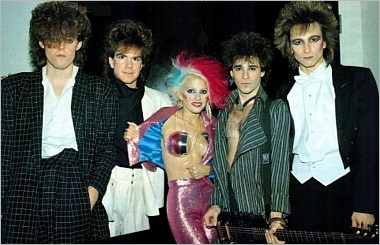 However, when I arrived for the audition, I found out that they needed a keyboard player who had the coordination to play left hand (very fast) bass parts in odd time signatures, while at the same time playing keyboard parts in the right hand in different time signatures!
However, when I arrived for the audition, I found out that they needed a keyboard player who had the coordination to play left hand (very fast) bass parts in odd time signatures, while at the same time playing keyboard parts in the right hand in different time signatures!
I had no problem playing either hand alone, but had never played keyboard bass & keyboard parts at the same time. So, I failed the audition but we still had a fun birthday dinner that night. During the course of the audition, they played four songs for me which they’d recorded with producer Ken Scott (The Beatles, David Bowie, Supertramp) up at Frank Zappa’s house.
I really loved the tracks they’d played for me, so the next day I made the decision to get up at 5 am every morning and practice the new technique of left hand bass and right hand keys, in odd time signatures, first in slow motion, then very fast, until I was proficient enough to audition again. After a couple of weeks I asked for another audition, and this time got the job.
That turned into a whirlwind of activity – Missing Persons started playing live in late 1980 and we sold out 40 shows in a row in Los Angeles prior to getting signed, primarily because the other 3 members of the band had worked extensively with Frank Zappa, who had a big Los Angeles following. I must say it was an extraordinary experience. Terry Bozzio, arguably still one of the greatest living drummers, Warren Cuccurullo, an amazingly creative guitarist who went on to play with Duran Duran for twelve years, and Dale Bozzio, a fashion leader long before Lady Gaga and Madonna, and myself played gig after gig for those first 18 months.
In 1981, once the band had some label interest, we were joined by the talented bassist/composer Patrick O’Hearn, who is a wonderful artist in his own right. Although we were initially rejected by some labels, our manager/producer Ken Scott persisted, and decided it would benefit us to tour in Canada, and then play some dates in New York City area to prove we could attract fans outside of California. Capitol Records staff in NY heard us, on that trip, where we played three sold out shows, the Peppermint Lounge, the Ritz, and a live concert recording for the venerable rock station, WPLR-FM Long Island. When we returned to Los Angeles, Capitol Records signed the group.
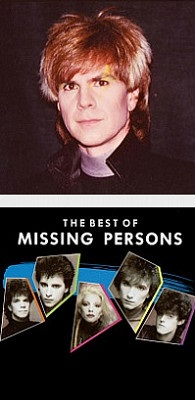 One of my fondest memories from those days was taking a copy of our 4-song EP (phonograph record in those days) to radio station KROQ in 1980. It was very difficult to get music to KROQ, so I waited in the parking lot after everyone left, and as one of the employees was leaving, I propped open the back door with a twig. When the lot had cleared out, I went in and gave our EP to the on-air DJ, Freddie Snakeskin who happened to be program director for KROQ. About 2 weeks later we were riding in a car to rehearsal and heard our song Mental Hopscotch on the air. That song went on to become #1 song of the year in LA before we were even signed. From that point on, our Los Angeles gigs were often introduced by Dusty Street, Jed the Fish, and Freddy Snakeskin (program director for KROQ).
One of my fondest memories from those days was taking a copy of our 4-song EP (phonograph record in those days) to radio station KROQ in 1980. It was very difficult to get music to KROQ, so I waited in the parking lot after everyone left, and as one of the employees was leaving, I propped open the back door with a twig. When the lot had cleared out, I went in and gave our EP to the on-air DJ, Freddie Snakeskin who happened to be program director for KROQ. About 2 weeks later we were riding in a car to rehearsal and heard our song Mental Hopscotch on the air. That song went on to become #1 song of the year in LA before we were even signed. From that point on, our Los Angeles gigs were often introduced by Dusty Street, Jed the Fish, and Freddy Snakeskin (program director for KROQ).
During that same period, Les Garland, an A & R person from Atlantic Records had become a fan of the band, and though Atlantic didn’t sign us, Les went on to become Senior VP of the new Music Television station, MTV, and once we were signed to Capitol, we soon had six videos in heavy rotation, which helped enormously.
John: Fascinating Chuck! In addition to being a band member for Missing Persons you were a session musician on albums for many music celebrities including Paula Abdul, The Pointer Sisters, Frank Zappa and the late Michael Jackson to name a few. Would you like to tell of your experiences while working with famous celebrity artists?
Chuck Wild: In the mid 1970’s I was playing in a blues band in Zebulon, NC, and actually lived in a studio called Mega Sound Studios in nearby Bailey, NC. I traded a place to live in return for playing sessions and keeping the place clean. My initial training in recording arts came from a wonderful engineer by the name of Richard Royal, who was one of the studio owners. So I got a lot of early studio experience in those days. As I mentioned, Missing Persons’ producer on our first album was Ken Scott, and I sat behind Ken whenever possible to learn as much as I could. Missing Persons’ second full-length album, Rhyme and Reason, was produced by legendary five time Grammy-winning engineer/producer Bruce Swedien who had been Quincy Jones’ engineer for over 35 years, including having engineered Thriller and most of the other Michael Jackson albums. Over the years Bruce and his wonderful wife Bea have been mentors for me, and were instrumental in encouraging me to begin the Liquid Mind® series.
In 1987 I co-wrote (and played on) a song for the Pointer Sisters called Say the Word with Grammy-winning producer Glen Ballard and the late great songwriter, Marti Sharron. Glen started calling me for some sessions, including a song on Paula Abdul’s debut album. My longest stint in the studio began when Bruce Swedien called me in 1994 to ask if I’d like to program sounds for Michael Jackson’s HIStory album. I said yes, and I continued to create soundscapes, sounds, and do some percussion programming for Michael between 1994 and 1998. The money I earned from Michael those years helped me to start Chuck Wild Records in the early days, in order to distribute Liquid Mind. Suzanne Doucet, a friend and wonderful New Age artist in her own right, was instrumental as a consultant in setting up my label and distribution, and in guiding me through the trials of running a small label.
John: When you were signed as a staff songwriter to Lorimar Telepictures and Warner/Chappell Music, and also in the years to follow, you’ve composed over 125 songs, scores, and compositions for the television and film industry. Who are some of the artists who’ve recorded your songs?
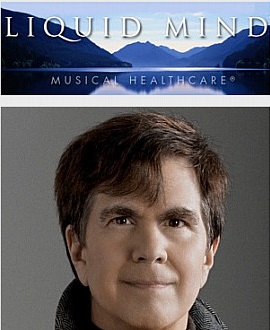 Chuck Wild: After co-writing the above mentioned song for the Pointer Sisters, I was approached by Linda Perry, VP of Lorimar Telepictures Music Publishing Division about becoming a staff songwriter there. My deal continued with Warner/Chappell Music after Warner Brothers purchased Lorimar a couple of years later.
Chuck Wild: After co-writing the above mentioned song for the Pointer Sisters, I was approached by Linda Perry, VP of Lorimar Telepictures Music Publishing Division about becoming a staff songwriter there. My deal continued with Warner/Chappell Music after Warner Brothers purchased Lorimar a couple of years later.
A lot of artists recorded songs I wrote or co-wrote back then including Philip Bailey (from Earth Wind & Fire), Jennifer Rush (I co-wrote a #1 song in Europe for her Passion album called You’re My One and Only), Tommy Page (now a publisher at Billboard Magazine), Glen Medeiros (who sang High Wire from one of the Karate Kid films), Hidden Faces (who sang Hurt So Bad to Love which has appeared in several films), the legendary Japanese band Wink recorded my song One Kiss At a Time.
Thelma Houston, Gary Lemel, Vector, Angela Cole, the Perri Sisters and David Pomeranz are some of the other artists recording my songs back then. In the early 90’s I also recorded two libraries of neo-classical instrumental music, which have had hundreds of plays in dozens of television episodes & films.
More recently I’ve also co-written a number of songs for television & film with the Emmy-winning president of the California Songwriters’ Association, Michèle Vice-Maslin, including Starr X’d Lovers, our Emmy-nominated song in 2011.
John: After leaving Missing Persons you began producing music designed for relaxation under the artist name Liquid Mind®. What was the turning point in your life that led you to begin producing music in the new age genre that is near opposite to the music of Missing Persons?
Chuck Wild: In 1987 while co-composing music with Michael Hoenig for the Emmy-winning Max Headroom ABC-TV series, the filming & post-production of the show got seriously behind schedule, and instead of having 2-3 weeks to score each episode, we typically had only 4-5 days to score, write, arrange and mix 43 minutes of music for each episode, meaning there was little time for sleep. For three months, I slept only about 4 hours a night, usually in the studio. At the same time, a large number of my friends were dying of what was then called AIDs, so I was very stressed out and sleep deprived. I started having anxiety attacks, then panic attacks. The show was cancelled in late 1987 and I went home to rest, and actually became agoraphobic (wouldn’t leave home for several weeks).
At one point during a particularly bad panic attack, co-composer Michael Hoenig and Peter Wagg, the producer of Max Headroom, took me to an urgent care clinic. After examining me, the doctor held up two things in his hands. In one hand was a bottle of anti-anxiety medication, in the other hand was a sheet of paper with instructions on how to do a simple clearing meditation. The doctor said, “Chuck, they both work equally as well for what you have – clinical anxiety. It’s up to you: Medication or Meditation?
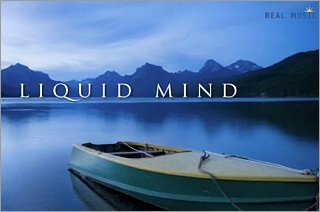 There’s only one letter difference between the two.” I chose meditation over medication that day. The instructions were for a simple clearing meditation, just breathing slowly in and out and counting a number for each breath from 1 to 10, and repeating over and over. To this day, I still have a section at my site for a “meditation break” with those instructions.
There’s only one letter difference between the two.” I chose meditation over medication that day. The instructions were for a simple clearing meditation, just breathing slowly in and out and counting a number for each breath from 1 to 10, and repeating over and over. To this day, I still have a section at my site for a “meditation break” with those instructions.
The meditation helped quite a bit, but I was still unstable at times. My friend Jeff Kingfisher (composer, recording artist, and inventor of Muzoracle, Musicians Dice, and Muzundrum musical board game) suggested I see a counselor friend of his. The counselor suggested that, as part of my healing from anxiety/panic, I try to compose the type of music that represented the way I wanted to feel.
Liquid Mind was borne of the thought: Music can help heal me, and sonically represented the calm I yearned for. She also encouraged me to increase my meditation time to an hour a day.
Though I don’t meditate that long these days, it was a great help to me at the time, and brought me much peace. My early meditations and slow music efforts (especially Zero Degrees Zero from the first Liquid Mind album), plus some intensive therapy with excellent counselors, brought me some relief, enough to leave the house and start a routine of counseling and weekly acupuncture. Within a couple of years, I was pretty much anxiety free and physically recovered from the harm I’d done myself in those 3 months of sleep deprivation and stress.
John: What would you say are the defining characteristics of Liquid Mind Music?
Chuck Wild: There are several readily identifiable characteristic of my music. First and foremost, the music has no predominant rhythm, and is sometimes called “zero beat” music. One day while sitting on the rocks in Laguna Beach, CA, on a therapist-mandated “mini vacation”, I realized that the sound of the ocean was continuous, low and rich, tonally complex, never stopping, and deeply relaxing. That day I came up with the name “Liquid Mind” (i.e. liquid-ocean was relaxing my mind). I determined that the sonic characteristic of my healing music must be similar to the ocean.
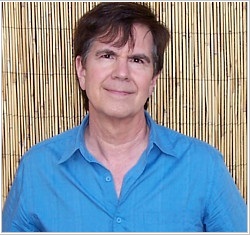 I favor low frequencies, continuous sound, absence of any predominant rhythms, gradual but sometimes complex textural and harmonic changes, moving at about the speed of my breathing, ebbing and flowing at times, and the inclusion of sampled vocal sounds subtly playing chords. Live singers weren’t added until later albums, but I definitely prefer the more organic live vocal textures. Tenors AJ Teshin and Seven Whitfield have sung on almost every album since 2001, and more recently tenor Jimmy Demers as well.
I favor low frequencies, continuous sound, absence of any predominant rhythms, gradual but sometimes complex textural and harmonic changes, moving at about the speed of my breathing, ebbing and flowing at times, and the inclusion of sampled vocal sounds subtly playing chords. Live singers weren’t added until later albums, but I definitely prefer the more organic live vocal textures. Tenors AJ Teshin and Seven Whitfield have sung on almost every album since 2001, and more recently tenor Jimmy Demers as well.
This music is tedious to record, to say the least, since the pieces are long form (many are 10-15 minutes length), and so slow moving. Liquid Mind albums can take 5-7 months to write, arrange, record, mix, and master. Also, as I’ve been caffeine free since 1988, I definitely get drowsy while working on this music, especially during the mixing process and have learned the benefits of a fifteen-minute power-nap!
John: What is sedative or therapeutic music primarily used for?
Chuck Wild: Music therapy, which includes almost every style of music imaginable, is administered by a certified music therapist (who often has a master’s degree in music therapy), and can help most anyone who has a health issue. My sedative music is but a tiny part of the music therapist’s toolbox. The American Music Therapy Association, a wonderful organization which certifies and educates music therapists, says this: “Music Therapy is an established healthcare profession that uses music to address physical, emotional, cognitive, and social needs of individuals of all ages. Music therapy improves the quality of life for persons who are well, and meets the needs of children and adults with disabilities or illnesses.”
I’m not a music therapist myself, but as a composer of therapeutic music, I’m an associate member of the American Music Therapy Association, and was honored to receive their Presidential Award in late 2009. The terms “sedative” and “stimulative” are used to describe less active and more active music. It’s up to the attending physician and the attending music therapist to decide together whether a patient needs relaxation (as in the case of folks with PTSD, anxiety, pain, grief, emotional exhaustion, sleep deprivation etc.) or stimulation (like some elderly, for example, or someone who’s suffered a stroke).
John: Scientific studies have documented the positive effects of therapeutic music, and in your case the benefits of calming music proved to be successful by relieving your personal medical issues with anxiety and panic attacks. But do you feel music therapy can be beneficial to everyone?
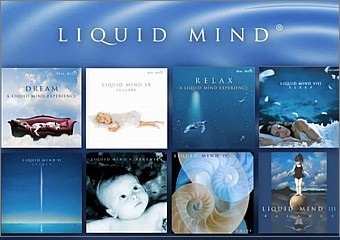 Chuck Wild: Music therapy interventions can be designed to manage stress, help folks learn to express their feelings, alleviate physical pain, improve communication, promote physical rehab, enhance memory, and generally promote wellness. It’s really quite amazing, and most music therapists use music with characteristics that are proven in evidence-based research to achieve a particular healing effect.
Chuck Wild: Music therapy interventions can be designed to manage stress, help folks learn to express their feelings, alleviate physical pain, improve communication, promote physical rehab, enhance memory, and generally promote wellness. It’s really quite amazing, and most music therapists use music with characteristics that are proven in evidence-based research to achieve a particular healing effect.
John: Of course one doesn’t need to have a specific medical issue like panic attacks to benefit from, and enjoy your music, so what are some of the ways people use Liquid Mind Music other than this particular medical disorder?
Chuck Wild: A lot of folks use my Liquid Mind music to relax prior to going to sleep. Dr. William Dement, the “father of sleep medicine” offered an unsolicited endorsement of my 8th album, Liquid Mind VIII: Sleep as part of a pre-sleep routine. I collated some “sleep tips” from his book and other sources, which can be accessed from my website. Massage therapists and yoga instructors use Liquid Mind frequently. One use I don’t recommend is driving while listening to my music. There’s a warning on every CD & my website about that.
Liquid Mind is also used in dozens of healthcare settings for different purposes. I’ve heard from doctors, nurses, music therapists, state prison counselors, drug rehabs, hypnotherapists, yoga instructors, massage therapists, acupuncturists, psychologists, cancer chemotherapy centers, psychologists and other counselors, ministers, meditation teachers, hospice caregivers, special needs school teachers, and many patients who use the Liquid Mind® music for healing. I’m quite humbled by the over two thousand gratitude emails I’ve received from patients and their families. I never imagined there would be that much interest in my music.
John: Like you stated earlier, Liquid Mind albums are composed using specific techniques based on scientifically supported research to achieve the desired physical responses. Based on these scientific studies, could you tell us the techniques you use when composing your music?
Chuck Wild: Evidence based research does support some characteristics of Liquid Mind – bass (lower) frequencies and vocal sounds are perceived to be relaxing to humans, because when we’re in the womb, a safe place prior to birth, we don’t hear a lot of treble frequencies, it’s more muffled sounds, and we get used to the sound of our mother’s voice, so there is that familiarity. I’ve done some unpublished research myself using a bi-spectral index anesthesia monitor, and determined that continuous slow music (similar to ocean sounds) has a “masking” effect on other environmental sounds, making it much easier to relax.
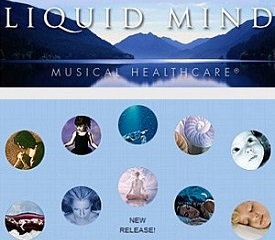 There is also the effect of entrainment, which in a reverse way, in my own non-scientific opinion, helps Liquid Mind to relax folks. Entrainment is the propensity for two oscillating systems (imagine two pendulum clocks on a wall) to entrain and move at the same time. This happens in biological systems as well. When I hear fast music, my heart rate rises. When I hear slow music, my heart rate falls as muscle relaxation ensues.
There is also the effect of entrainment, which in a reverse way, in my own non-scientific opinion, helps Liquid Mind to relax folks. Entrainment is the propensity for two oscillating systems (imagine two pendulum clocks on a wall) to entrain and move at the same time. This happens in biological systems as well. When I hear fast music, my heart rate rises. When I hear slow music, my heart rate falls as muscle relaxation ensues.
My recording process is as follows: (1) I spend 4-5 weeks sketching about 40 pieces, 10-20 minutes each (2) I choose the best 5 or 6 pieces (3) I spend 6-10 weeks arranging, really the most difficult stage, where I’m smoothing any attacks on the sounds I use (generated from 10-15 synths and dozens of tracks of live vocals).
The music sounds quite simple, but the texture is always in motion under the surface. (4) 6-10 weeks mixing and creating the sonic fingerprint of Liquid Mind. (5) 2 weeks premastering where I reduce certain mid-high frequencies, boost certain bass frequencies and importantly to volume-match within and between the pieces.
I don’t want someone to have to reach for a volume adjustment while they’re listening. (6) 1 or 2 weeks mastering with Bernie Grundman here in Hollywood. Bernie is a legend in the recording industry and he and Joe Bozzi supervise the final touches of the process.
John: Liquid Mind albums are consistent best-selling albums making the Top 25 sales charts at Billboard again and again. In fact your 8th album Liquid Mind VIII: SLEEP was on the Billboard top 25 sales charts for over a year, and has reached #1 on the iTunes USA Top Ten New Age Chart countless times. Were you at any point surprised by the widespread popularity of your work has received or did you “just know” your music would achieve universal acceptance?
Chuck Wild: I never really expected to have the kind of acceptance I’ve had for Liquid Mind®, it was a pleasant surprise when I started charting on iTunes. I’ve always worked hard at making Liquid Mind “pay for itself” as a business, but was surprised when Liquid Mind VIII: SLEEP showed up on the Billboard® New Age sales charts for over a year running.
John: To say your music career is diverse is an understatement Chuck! You have received a lot of recognition for your work as Liquid Mind over the years so would you please tell us about the honors and awards you’ve achieved?
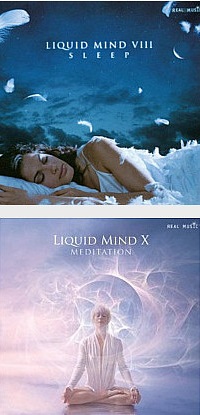 Chuck Wild: I’ve had some recognition from the Academy of Television Arts & Sciences (Emmy® nomination), the American Music Therapy (Presidential Award for advocacy and support of the music therapy profession), Billboard and iTunes USA charting dozens of times (for sales), Coalition of Visionary Resources award for Best Meditation/Healing Album for Liquid Mind VI: Spirit, Northern California Independent Film Festival best score honors for the award-winning short animation film “Horses on Mars” which exclusively used music from the first Liquid Mind album. Most recently, the prestigious Zone Music Reporter, representing US new age broadcasters and program directors, has nominated my new album, Liquid Mind X: Meditation for Best Electronic Album of 2012.
Chuck Wild: I’ve had some recognition from the Academy of Television Arts & Sciences (Emmy® nomination), the American Music Therapy (Presidential Award for advocacy and support of the music therapy profession), Billboard and iTunes USA charting dozens of times (for sales), Coalition of Visionary Resources award for Best Meditation/Healing Album for Liquid Mind VI: Spirit, Northern California Independent Film Festival best score honors for the award-winning short animation film “Horses on Mars” which exclusively used music from the first Liquid Mind album. Most recently, the prestigious Zone Music Reporter, representing US new age broadcasters and program directors, has nominated my new album, Liquid Mind X: Meditation for Best Electronic Album of 2012.
John: You are an artist with most of your albums on the successful Real Music Label, which features a quality lineup of top industry artists like yourself. What are the advantages to marketing your music through the Real Music Label?
Chuck Wild: John, I ran my own label for 10 years (1994-2004), focusing only on Liquid Mind, supervising employees and working seven days a week, with very long hours. That left me little time to create music, and even less time to “have a life.” In 2004, I decided to approach Terence Yallop and his wife Karen Kael, the owners of Real Music, about taking over distribution (i.e. licensing) of my first six albums, and also signing a recording agreement for four additional albums.
I’d met Terence in 1994 or 1995, and by 2004, and knew he and Karen had been meditating to my Liquid Mind music almost daily for ten years, so it seemed like a good fit. Real Music has real integrity, being one of the few New Age labels to survive the mergers of the 80’s, 90’s and 00’s, and to prosper in the downturns that have plagued the music industry. Terence and Karen and the wonderful staff at Real Music have remained true to their mission of bringing the music of relaxation, renewal and healing to everyone on the planet who can benefit from it.
To answer your question more specifically, there are economies of scale from being signed to a label. I get to work less time on administration and more time on music. Real Music has been a respected and established label for over 25 years in this niche, and it’s a relief to have the label administering, promoting and distributing my catalog. BTW, most recently my friend and Real Music label mate Omar Akram won the Grammy for his latest album.
John: What would you say are the fundamental differences in the music you compose versus meditative or made for relaxation albums created by other artists in the same category?
Chuck Wild: There is wonderful relaxation/meditation music by many artists from all over the world. Since relaxation is often cultural, something that may be relaxing in one country or society might not be perceived favorably in another. So, it’s a bit difficult to compare artists. I’d say Liquid Mind has different characteristics than some relaxation music. My music tends to be slower; perhaps more mellow sonically, laced with European classical harmonies, and is notable for the absence of any percussion instruments. I don’t listen much to other artists unless I’m working with them, so don’t consider myself an expert. One of my former students, the talented composer and performer Armen Chakmakian, is fond of saying that all music is relaxing and healing to someone. I fully agree.
John: Liquid Mind albums and songs are available on audio CD, but is all of your music available as digital downloads too?
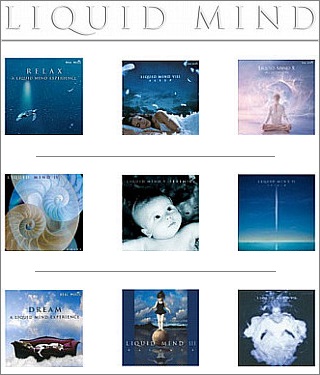 Chuck Wild: Yes, all twelve albums (ten studio CDs and two compilations) are available both digitally and on CD. 70% of Liquid Mind sales are now digital, fewer CDs are still being sold these days. All twelve Liquid Mind® albums are sold through iTunes, Amazon.com, CDBaby.com, and dozens of digital sites. Real Music also sells all albums, both in digital and physical CD copies. Liquid Mind is streamed around the clock on Pandora, Spotify and just about every streaming service, as well as dozens of internet radio stations, digital television, and Sirius XM.
Chuck Wild: Yes, all twelve albums (ten studio CDs and two compilations) are available both digitally and on CD. 70% of Liquid Mind sales are now digital, fewer CDs are still being sold these days. All twelve Liquid Mind® albums are sold through iTunes, Amazon.com, CDBaby.com, and dozens of digital sites. Real Music also sells all albums, both in digital and physical CD copies. Liquid Mind is streamed around the clock on Pandora, Spotify and just about every streaming service, as well as dozens of internet radio stations, digital television, and Sirius XM.
John: It’s a well-known fact the music industry as a whole has experienced serious problems with piracy issues. Has there been much improvement regarding piracy as a whole, and have you ever experienced problems with piracy yourself?
Chuck Wild: Unfortunately, the technological advances that enable file sharing have hit our industry (and many other industries) hard. At one point, all my Liquid Mind albums were on nearly 100 pirate websites.
It can be disheartening, but there’s really nothing substantial that can be done about it until music fans grow to understand the harm free file-sharing does to artists, engineers, producers, songwriters, composers, performers, and employees of labels. I think the most devastating effect of piracy is that it has caused the disappearance of several major labels, and destroyed a portion of the major label “farm club” system that used to nurture new artists.
These days, instead of a new artist spending their time on music, they must become musical entrepreneurs, wearing every hat (producer, engineer, publisher, label, PR person, social media expert, marketer, and so forth). I personally believe that the quality of music has suffered and the majority of new artists are never able to make a “sustainable” living at music now.
Major labels have been criticized for being greedy and taking advantage of artists, which may have happened in some cases, however, it’s estimated that only 5% of artists ever sell enough albums to break even. The other 95% of artists used to be supported by the top 5%. But that system of artist development is no longer in place for the most part.
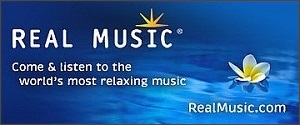 Individuals and some websites like Kickstarter have stepped in to fill that void, but these efforts require a lot more time commitment to business by the artists, meaning less time to grow musically. Pirate sites do, in a sense, provide some promotional value, as long as folks go on to support artists by purchasing some tracks, but there is no proof that this is happening on a large scale and overall music sales have declined over 50%.
Individuals and some websites like Kickstarter have stepped in to fill that void, but these efforts require a lot more time commitment to business by the artists, meaning less time to grow musically. Pirate sites do, in a sense, provide some promotional value, as long as folks go on to support artists by purchasing some tracks, but there is no proof that this is happening on a large scale and overall music sales have declined over 50%.
Like every other artist, Liquid Mind has been hit by file-sharing. I’m in hopes that folks are now coming to the understanding that artists, composers, singers, arrangers, engineers, mixers, studios, and label staff spend many months creating an album and preparing for release, and are just asking for fair compensation for their time. Though I enjoy music production, it is a business for me, and every other artist, especially as we grow older. Without support of fans and listeners, many artists will need to turn elsewhere to make a living.
John: During interviews I try to provide the latest press news for my artist and their fans if possible. Can you release any news information or perhaps give us the details if you have plans for a new Liquid Mind album?
Chuck Wild: I have no plans for release of a new Liquid Mind album, having just released Liquid Mind X: Meditation in September 2012. This year, I’m focusing on pop music production, and my classical piano pieces.
John: You have enjoyed several distinctly separate, but highly successful careers in your lifetime. What do you find most rewarding, songwriting/composing, production or being a musician?
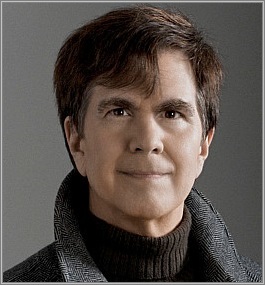 Chuck Wild: In my own case, the three are synergistic, and I find reward in all of them. I love what the great writer Pearl Buck said: “The secret to joy in work is excellence.” I strive for (but never fully achieve) excellence.
Chuck Wild: In my own case, the three are synergistic, and I find reward in all of them. I love what the great writer Pearl Buck said: “The secret to joy in work is excellence.” I strive for (but never fully achieve) excellence.
The process is what keeps me going, especially when working with folks who have high standards and are willing to take the time required for high quality work. I’m producing a young artist now, one of the singers from NBC’s The Voice, Nathan Parrett.
He’s a terrific talent both as singer and songwriter, and it’s one of those opportunities to excel that make me get up every morning with a smile on my face. As well, I’ve written seven short classical preludes for piano, available for free at ChuckWild.com (including pdf sheet music), and am about one-third of the way through a long form (22 minute) piano sonata at the moment.
John: I enjoyed reading more about your fascinating life and career while preparing for our interview together Chuck. I hope we have a chance to interview again in the future. In closing for now, I want to thank you again for giving everyone this opportunity to find out the latest news about you, and the music of Liquid Mind. Is there anything you would like to express to the fans that have supported you over the course of your career?
Chuck Wild: I’m incredibly grateful to fans of Liquid Mind, and the many healthcare practitioners that use my music for healing. There is no greater reward for me than knowing someone’s life is made easier by listening to my music. Thanks so much, John, for this opportunity to be part of your wonderful website. I want you to know how much I and many other artists appreciate your support of the music profession and music creators.
To listen to samples or purchase songs and albums by Liquid Mind®, visit LiquidMindMusic.com. To learn more about Chuck’s non-Liquid Mind projects at ChuckWild.com. To find album and single digital downloads, CDs and song samples, visit Liquid Mind at RealMusic.com. Liquid Mind albums and songs may also be sampled or purchased at Amazon.com and iTunes.com. Follow Chuck at Facebook and Twitter social media. Photo and cover art courtesy Chuck Wild & Glen Wexler.
 Music of every popular genre is a stimulus that is proven to touch our emotions in a variety of ways. This broad statement has been recited well enough that everyone should be in agreement, knowing firsthand that music can induce sensations and emotional responses from exhilaration to melancholy, and every emotion in-between. Some songs can relax a person to the point it will lull them to sleep.
Music of every popular genre is a stimulus that is proven to touch our emotions in a variety of ways. This broad statement has been recited well enough that everyone should be in agreement, knowing firsthand that music can induce sensations and emotional responses from exhilaration to melancholy, and every emotion in-between. Some songs can relax a person to the point it will lull them to sleep.
The Liquid Mind Musical Healthcare® experience developed by Emmy® nominated songwriter and recording artist Chuck Wild, is one of today’s most advanced forms of music designed specifically for sound relaxation and sleep therapy.
Of the 11 best-selling Liquid Mind albums, Dream: A Liquid Mind Experience is the newest relaxation album from Los Angeles based composer, Chuck Wild, a 2009 recipient of a President’s Award from the American Music Therapy Association.
Relax: A Liquid Mind Experience is another sleep enhancing album by Chuck Wild that spent 71 consecutive weeks in Billboard Magazine Top 10 New Age Chart.
Chuck Wild of Liquid Mind is a top recording artist with over 30 years of experience in the music industry. During his lengthy tenure, Chuck Wild has composed over 125 songs, some of which were employed in the television and film industry. Many of you may already be familiar with him like I was since Chuck is a popular artist associated with the high profile groups Missing Persons, Paula Abdul, Frank Zappa, the late Michael Jackson, and a host of top-ranked, pop music icons.
Relax: A Liquid Mind Experience is a Best Selling New Age Album at Amazon, and Liquid Mind VIII: Sleep, was recently the #1 album in the U.S Top Ten New Age Chart at iTunes. This is in direct correlation to his top-ranking status as an artist.
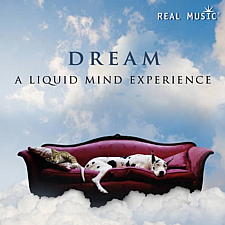 Dream: A Liquid Mind Experience, on the Real Music Label, is a popular Liquid Mind album getting a wide awake, positive yes response from Billboard and iTunes in 2012. Liquid Mind relaxation albums have consistently made the Top 10 Album charts and Top 10 Song charts at Billboard and iTunes.
Dream: A Liquid Mind Experience, on the Real Music Label, is a popular Liquid Mind album getting a wide awake, positive yes response from Billboard and iTunes in 2012. Liquid Mind relaxation albums have consistently made the Top 10 Album charts and Top 10 Song charts at Billboard and iTunes.
Chuck Wild is a musician, and not a physician, so he doesn’t make scientific claims about his calm music for relaxation therapy. However his composing techniques do involve non-rhythm, musical metrics and specific filtering of mid and high range frequencies to achieve like physical responses of scientifically supported research. Developed to treat his individual anxiety disorder, the free flowing music is a stimulus intended to help direct other people into a calming state of relaxation. Perhaps his peaceful music will help you get to sleep too.
Even the title Liquid Mind suggests an orchestration that carries a balanced cloud of relaxation. It is like a mental picture portraying his calming song melodies in the form of two words. Perfect for people who like to experience the full spectrum music has to offer, the focus on made for relaxation music is crystal clear.
Liquid Mind albums may or may not put you to sleep, but once you experience the balanced sound qualities for yourself, an image of comforting music that floats weightlessly in your mind becomes even clearer.
Visit LiquidMindMusic.com and sample or purchase his albums and digital downloads at RealMusic.com or Amazon.com. You can get a free mp3 of the song Serenity from the Liquid Mind V: Serenity release. Photos are courtesy Chuck Wild.
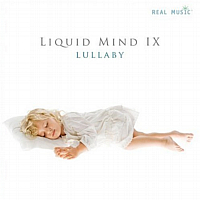 Chuck Wild of Liquid Mind is the artist behind his best-selling Liquid Mind albums made for relaxation. While Liquid Mind albums are popular arrangements made specifically for relaxation and sleep, every one of the 11 Liquid Mind albums is perfect for yoga and massage. Developed by Emmy® nominated songwriter and recording artist Chuck Wild, Liquid Mind is synonymous with health, wellness, and relaxation.
Chuck Wild of Liquid Mind is the artist behind his best-selling Liquid Mind albums made for relaxation. While Liquid Mind albums are popular arrangements made specifically for relaxation and sleep, every one of the 11 Liquid Mind albums is perfect for yoga and massage. Developed by Emmy® nominated songwriter and recording artist Chuck Wild, Liquid Mind is synonymous with health, wellness, and relaxation.
Liquid Mind IX: Lullaby is one of the many releases Chuck Wild produced in his Liquid Mind Musical Healthcare® series. His advanced forms of music have universal appeal by the various benefits with health related conditions related to wellness.
Liquid Mind IX: Lullaby is a fine example of the diverse health related practices in which his orchestrations are employed. Designed for sound relaxation and sleep therapy in mind, people who teach or perform yoga and massage have many positive comments about Chuck Wild, and his universal music with widespread appeal. People who have benefited from his music made comments in the song video below.
Sample Whisper to Me from Liquid Mind IX: Lullaby album and visit LiquidMindMusic.com. Cover art courtesy Chuck Wild.

